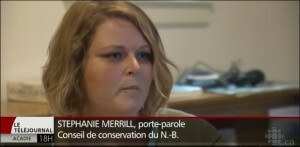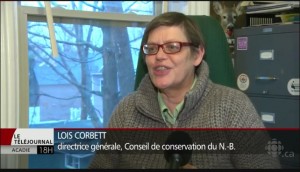Conservation Council staff were featured in the evening news of New Brunswick’s francophone media this week.
French spokesperson, Pascale Ouellette, appeared on Téléjournal Acadie on Nov. 30 to talk about the UN climate change summit happening now in Paris and where New Brunswick stands in Canada for greenhouse gas emissions.
Ouellette told Téléjournal Acadie that the province is already behind other provinces.
“NB Power’s utility timeframe to get rid of coal is 2045, a full 30 years slower than Ontario, 20 years later than all of Britain and a decade longer than even Alberta. This plan puts New Brunswick behind other provinces,” Ouellette said.
Read the full article (in French) and watch the video here.

Stephanie Merrill, Director of Freshwater Protection, spoke to ICI Radio-Canada on Dec. 3 about the provincial government’s approval of the Sisson Mine project’s Environmental Impact Assessment.
Merrill said she was surprised by the announcement because final approval of the project is a joint process between the provincial and federal government, and the feds have yet to submit its review. She said the Conservation Council is a participant in the federal process and iscommitted to seeing it through. Watch the video here. Merrill appears at 8:50.
Merrill told CBC News the move was also surprising considering the independent review panel report on Sisson hasn’t been released to the public yet, despite a requirement that it be done so prior to EIA approval and conditions being released.

Lois Corbett, Executive Director of CCNB, also appeared in ICI Radio-Canada’s evening news on Dec. 3 during a segment on the UN climate change summit in Paris. Corbett spoke about greenhouse gas emissions in Canada and how it is entirely possible for companies to reduce emissions while still producing profits and driving down operating costs. Watch the video here. Corbett appears at 15:50.
“The forest industry and more specifically the pulp and paper industry in Canada has improved its environmental assessment a lot over the last ten years. It’s always possible for forestry companies to reduce their greenhouse gas emissions all while reducing their operation cost,” Corbett said.
